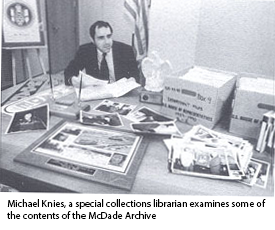Information Update - Spring 1999
McDade Papers Donated to University
- Congressman Joseph M. McDade, retiring after a distinguished 36-year career, has donated his congressional papers to The University of Scranton. The papers consist of legislation, correspondence, case files, project files, newsletters, memorabilia, campaign materials, subject files, audio-visual materials, and other materials documenting Mr. McDade's career since 1963. The material will document the congressman's legislative involvement and specific initiatives, economic revitalization efforts in northeast Pennsylvania, and relations with constituents and with political figures.
- Joseph McDade was first elected to Congress in 1963 and served continuously for six terms. He retired as the ranking Republican in length of service in the House. The congressman served as vice chairman of the House Appropriations Committee. He also served as chairman of the Appropriations Subcommittee on Energy and Water Development, as vice chairman of the Appropriations Subcommittee on National Security, and as a member of the Subcommittee on the Interior.
Mr. McDade, a native of Scranton was a strong advocate for the Tobyhanna Army Depot and was instrumental in establishing the Delaware Water Cap National Recreation Area, the Steamtown National Historic Site, and the National Fishery Laboratory in Wellsboro. - He was also instrumental in University initiatives including the McDade Center for Technology Transfer, the Electronic Commerce Resource Center, and the Institute of Molecular Biology and Medicine. The McDade Center for Literary and Performing Arts at the University is named in his honor. Congressman and Mrs. McDade also established a scholarship fund to assist local students interested in pursuing government service. The University conferred an honorary Doctor of Laws degree on congressman McDade in 1969. He served on the University's Board of Trustees from October of 1977 until September of 1983. The Joseph M. McDade Congressional Collection comprises approximately 400 cubic feet and will he stored, appraised, arranged and described in a newly renovated room in Weinberg Memorial Library.The material arrived at the University in mid-December. The Library plans to hire a project archivist. to arrange and describe the collection.

- Congressional collections are archivally challenging and often quite large. However, much of the material might be duplicates, easily obtainable published documents, "housekeeping" documents such as telephone bills, requests for flags, and form letters - all of which can be discarded. In some collections this type of material is grouped within self-contained series which are readily removed. In other collections these unimportant documents are mixed in with historically important material and require a much greater effort to remove.
- Once the unimportant material has been removed, the valuable documents can be evaluated. Congressional collections usually have the following types of historically valuable material. There are copies of bills introduced or sponsored by the congressman, often with personal notes concerning the legislative process, correspondence between the congressman and political, institutional, or business figures, correspondence with private citizens (issue mail), speeches, newsletters, project files, press files, appointment books, and other material tracking daily activities.
- In some offices, each type or material is filed separately. In other offices an assortment of different types of material will be filed together in subject files. A 1971 file titled Vietnam might contain a newsletter discussing the war, a couple speeches, correspondence from citizens, notes from confidential committee briefings, and newspaper clippings. A subject oriented collection presents problems for an archivist. It is easier to maintain the collection as it was organized by the office. However, if a researcher is interested in studying how the congressman's newsletters changed over the years, the researcher would have to look through dozens, if not hundreds, of files in order to find all the newsletters. Furthermore, all the files would have to be closed for an extended period of time to protect the privacy of correspondents and the possibility that confidential information might be in a file. The alternative is for the archivist to rearrange the collection. The archivist would create a separate series for newsletters, speeches, correspondence, etc. Then series such as newsletters and speeches could be opened for research quickly, while confidential material would remain closed for the proper time. But rearranging such a large collection is a time-consuming operation.
- One large part of any congressional collection is casework. Case files document problems that private citizens have with government agencies. Handling such problems is one or the most important jobs that a congressional office undertakes. But there are significant archival problems with case files. Much of the material is similar (a Social Security problem in Kansas is much like one in Pennsylvania), and most of the files provide little important historical information. Furthermore, the case tiles often contain personal information about the citizen and must be closed to researchers for an extended period of time, up to 75 years in some cases.
- Consequently, most congressional repositories are no longer accepting case files except when the congressional district featured an unusual type of casework. Congressman McDade's district features such an unusual type of casework. Coal miners were susceptible to Coal Workers Pneumoconiosis, also known as Black Lung. Since 1969 the government has provided medical and financial assistance to victims of this potentially disabling disease. Both bituminous and anthracite miners were victims of Black Lung, but since anthracite is only present in eastern Pennsylvania there are few collections of anthracite Black Lung case work. The Black Lung files might contain medical information as well as personal accounts of mining and resulting disabilities that might be of interest to future historians. Because of the relevant scarcity of anthracite Black Lung case files and their potential historical value, the University will be retaining this type of case work.
- Due to privacy concerns, portions of the collection, such as the Black Lung case files, will not be opened to the public for a number of years. Other material will become available for research as soon as the collection is processed. None of the collection, however, will be available before the year 2000.
Michael Knies

